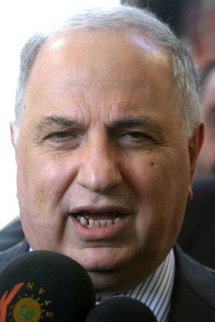
Ahmed Chalabi
"The appeal committee was submitted publicly to the pressure of foreign groups, like Vice President Biden who said when he was in Iraq (in January) that he hoped Iraqi justice will dissolve the committee of integrity and accountability," said Chalabi.
"Or when the American ambassador in Baghdad expressed his wish that the Iraqi justice system will solve an inconvenient matter -- the issue of the 500 candidates," he added.
The run-up to the election, the second parliamentary vote since Saddam's ouster almost almost seven years ago, has been dominated by a simmering row over who can take part.
More than 500 candidates were barred last month having been accused of ties to Saddam's outlawed Baath party. The list has been cut down to 145 after appeals and the decision of some parties to substitute alternative candidates.
However, the latest ruling did not reverse the exclusion of leading Sunni MP Saleh al-Mutlak.
The decision to bar candidates is especially contentious as Chalabi, who has close ties to Tehran and aims to unseat Prime Minister Nuri al-Maliki, heads the integrity and accountability committee who vetted the candidates.
Chalabi's close ally, Ali al-Allami, who was held in a US prison for a year, however, holds the title of executive director of the committee, and Chalabi has denied being involved in the process, which Washington has criticised as lacking transparency.
"I did not participate in the procedure of vetting the candidates," he said. "I had no role in this procedure."
Chalabi -- who served as deputy premier for six months in 2005 in an interim government -- was a key US ally when he spearheaded the case for war against Saddam.
The invasion was launched on the grounds that the dictator had stockpiled weapons of mass destruction. However, intelligence that Chalabi provided in support of those claims in the run-up to the war later turned out to be flawed and he subsequently fell out of favour with Washington.
------------------------------------------------------------------------
"Or when the American ambassador in Baghdad expressed his wish that the Iraqi justice system will solve an inconvenient matter -- the issue of the 500 candidates," he added.
The run-up to the election, the second parliamentary vote since Saddam's ouster almost almost seven years ago, has been dominated by a simmering row over who can take part.
More than 500 candidates were barred last month having been accused of ties to Saddam's outlawed Baath party. The list has been cut down to 145 after appeals and the decision of some parties to substitute alternative candidates.
However, the latest ruling did not reverse the exclusion of leading Sunni MP Saleh al-Mutlak.
The decision to bar candidates is especially contentious as Chalabi, who has close ties to Tehran and aims to unseat Prime Minister Nuri al-Maliki, heads the integrity and accountability committee who vetted the candidates.
Chalabi's close ally, Ali al-Allami, who was held in a US prison for a year, however, holds the title of executive director of the committee, and Chalabi has denied being involved in the process, which Washington has criticised as lacking transparency.
"I did not participate in the procedure of vetting the candidates," he said. "I had no role in this procedure."
Chalabi -- who served as deputy premier for six months in 2005 in an interim government -- was a key US ally when he spearheaded the case for war against Saddam.
The invasion was launched on the grounds that the dictator had stockpiled weapons of mass destruction. However, intelligence that Chalabi provided in support of those claims in the run-up to the war later turned out to be flawed and he subsequently fell out of favour with Washington.
------------------------------------------------------------------------









 Home
Home Politics
Politics









